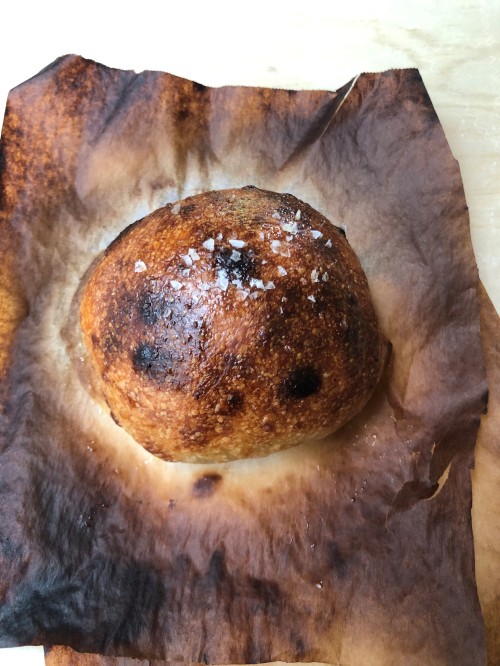
This recipe comes from Ester Restaurant in Sydney. The restaurant serves it with a cultured kefir cream, dashi jelly and salmon roe but it the “crusty on the outside and pillowy insides” told me that it would work just as good with some garlic prawns.

The recipe is a test of patience but it is well worth the wait. You’ll have to make the “potato ferment” five days before using it and then you proceed as if you were making a sourdough recipe (so, yes, you will also need a sourdough starter).

Ester’s Potato Bread
- 250 g Dutch Cream Potatoes
- 375 g water, heated to 27c
- 100 g levain (sourdough starter near it’s peak)
- 450 g white baker’s flour
- 50 g wholemeal baker’s flour
- 13g salt, plus extra for the potatoes
- Boil the potatoes until full cooked, then strain and pass through a ricer or mouli to form a smooth puree. Add 2% salt based on the weight of the potatoes. For example, 100 grams potatoes is 2 grams salt. Then place in a vacuum-seal bag and remove all the air. Leave this at room temperature for 5 days. Sometimes the bag will puff up (mine didn’t). Refrigerate the mix until needed.
- To make the bread, mix the water, 100 g fermented potato, and levain in a bowl of a stand mixer. Add in the two flours and salt. Using the dough hook attachment, mix on medium speed for 8 minutes.
- Allow the dough to bulk ferment for around 4 to 5 hours (depending on the weather, the colder it is, the longer you will need). Stretch and fold every 30 minutes for the first 2 hours (four folds in total). At this stage you can put it in the fridge or use it straight away.
- To use, pre-heat the oven with a pizza stone to as high as you can get it (at least 250c). Form the dough in to bread rolls (around 130g each) and allow to rest until the oven is ready.
- When ready to bake, slide the rolls on top of the pizza stone and throw in a few ice cubes in the oven to create some steam.
- Bake for 13 minutes. Remove then brush with olive oil and top with salt flakes.

Leave a comment